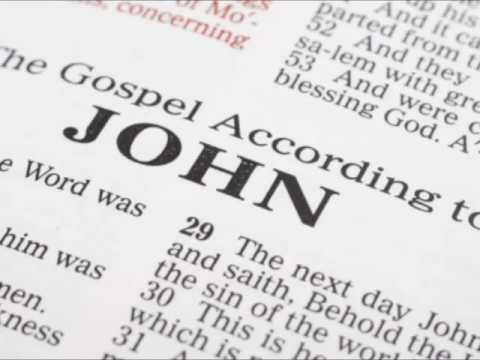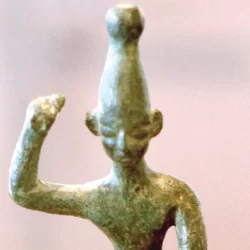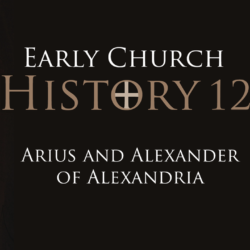
Have you heard of Scholars Version (SV) of the Gospels? It’s a translation pioneered by Greek expert Robert Funk in 1988 that has continued through several revisions through 2010. The SV of John 1 is particularly interesting, since they interpret λογος (logos) as God’s “word and wisdom” rather than a person distinguishable from God himself.
John 1
1 In the beginning there was the divine word and wisdom.
The divine word and wisdom was there with God,
and it was what God was.
2 It was there with God from the beginning.
3 Everything came to be by means of it;
and without it not one thing that exists came to be.
4 In it was life,
and this life was the light of humanity.
5 Light was shining in darkness,
and darkness did not master it.6 There appeared a man sent from God named John. 7 He came to testify–to testify about the light–so everyone who would believe through him. 8 He was not the light; he came only to testify about the light.
9 Genuine light–the kind that enlightens everyone
–was coming into the world.
10 Although it was in the world,
and the world came to be through it,
the world did not recognize it.
11 It came to its own place,
but its own people were not receptive to it.
12 But to all who did embrace it,
to those who believed in it,
it gave the right to become children of God.
13 They were born not from blood,
not from physical desire,
nor from male desire;
they were born out of God.
14 The divine word and wisdom became human
and resided among us.
We have seen its glory,
glory appropriate
to a Father’s only son,
brimming with generosity and truth.15 John testifies about him and has called out, “This is the one I was talking about when I said, ‘The one who’s coming after me ranks ahead of me, because he was before I was.'”
16 From his richness
all of us benefited–
one gift after another.
17 The Law was given through Moses;
mercy and truth came through Jesus the Anointed One.
18 No one has seen God;
the only son, close to the Father’s heart–he has disclosed <him>.Source: Robert J. Miller, The Complete Gospels (Oregon: Polebridge Press, 2010), 209-10.
In the footnote for John 1.1, the SV includes the following explanation:
the divine word and wisdom: This double phrase attempts to express for the moment the complex and difficult Greek term Logos, whose various meanings include concept, pattern, reason, speech, and revelation. Its precise function here will become clearer as this prologue unfolds.
What do you think about this translation? Does it make sense to you or is it taking liberties with the text? Personally, I take a personification view (with a traditional translation of λογος as “Word”), but I’m curious what others think.
For another translation that likewise translates the pronouns as neuter rather than masculine in John 1.1-18, see the Revised English Version.
For a presentation taking the personification view (preferring masculine pronouns for λογος) see Dale Tuggy’s “What John 1 Meant.”








In ancient Greece, the word logos was used by different philosophers to describe different concepts in the context of the activity of a divine reason in the world, e.g. in the sense of Providence, God’s actions or God himself. These schools of philosophy were widely known, and logos in the broad sense was firmly established at the time of the writing of the gospel of John.
Therefore, if we take into account both the cultural context and the fact that the prolog of John is a very carefully crafted piece of literature, then it seems inadequate to translate logos as mere “word”. The proposed “word and wisdom” is certainly an improvement, even though I would also put forward “reason” or even “plan”.
By the way: Such a culturally more appropriate translation would certainly still be open for trinitarian interpretation. It would just weaken the link to Genesis 1, which is tenuous at best anyway.
Thanks a lot for your work, Sean — grace and peace!
I like it. It makes these verses understandable to anyone, even the Gnostics.
The assumption that a “word” is a person at all continues to be propagated by the personal pronouns ascribed to the Greek logos. But it’s a fundamental mistake to confuse grammatical gender with biological or sexual gender. In the case of John 1:1 confusing a thing like “word” with a human male no less!
The first Protestant translations of the NT Greek into English (before the KJV 1611) referred to the logos as an “it” and “this” as well. Note Tyndale’s New Testament, 1534:
“In the beginning was the word, and the word was with God, and the word was god. The same was in the beginning with god. All things were made by it, and without it, was made nothing that was made. In it was life, and the life was the light of men, and the light shines in the darkness but the darkness comprehended it not”
Furthermore, that a “word” is never a person is verified by the OT. As a matter of fact apart from the opening verses in John 1 the scriptures never refer to the logos as a “he” or “him.” Some notable Trinitarian scholars even argue that the logos is not personified at all in the Hebrew scriptures.
Arthur Wainwright in his book “The Trinity in the New Testament” notes that “the Word was not personified in the OT nor even in rabbinic thought. Isaiah 55.11 is no exception.”
Wainwright adds “the nearest approach is Wisd. 18.15-16. (‘Your almighty word leaped from heaven.’) This too is probably a vivid poetical fantasy. It has been suggested that in the Targums the Word (Memra) was personified. The Memra of God was used as a reverential substitute for “God”, but this usage did not imply personification.”
But even if John is using this literary technique a personification, by definition, is not a person.
Like the logos, davar (Heb. for “word” in the OT) was simply understood as God’s creative “word, speech, utterance, commandment,” etc.
The Mercer Dictionary of the Bible notes that “both Wisdom and the Word dwell among God’s people, both act as God’s agents of creation, both are the reflection of the glory of God, and both bring light and life to God’s people.” Hence, “the word of God became flesh” language of John 1:14 echoes OT examples where other qualities of God were embodied in specially chosen agents of Yahweh. Moses’ face reflected “the glory of God” so vividly that he had to wear a veil whenever he spoke to the people (Ex 33-34); the prophets speak “the word of the Lord,” sometimes in the first person as God Himself; and wisdom was embodied in King Solomon.
This image was later used by people who celebrated their rabbis “as Torah incarnate” because they were said to have absorbed the Law of God.
In his book “The Incarnation of God” the late American Jewish scholar Jacob Neusner said “the reason that the Torah was made flesh was that the Torah was the source of salvation.”
So “the sage [i.e., a rabbi of Yahweh] was transformed into a salvific figure through his mastery of the Torah.”
Neusner goes on to cite a passage from the Talmud of the Land of Israel:
“He who sees a disciple of a sage who has died is as if he sees a scroll of the Torah that has been burned.”
That’s why to this day, some Orthodox Jews have a tradition of even burying old Torah scrolls.
According to a 2017 Times of Israel article Warsaw Jews held a burial of damaged Torah scrolls in the Polish capital. This was part of “an ancient ritual that some believe had not been carried out since” WW2.
Poland’s chief Rabbi at the time said the meaning of the ceremony was “about remembering that for us the Torah scroll is so important, is so holy, that when it’s no longer usable we bury it as if it was a human being.”
So if OT agents of God and even old Torah scrolls are seen this way, how much more God’s own uniquely procreated, supreme human agent, His own Son?
Sean,
Thanks for posting this. Interesting read. I think it makes sense, especially when compared to Proverbs 8 and wisdom being there in the beginning. If in fact John 1 is referring to the beginning as in creation. I am also partial to the view that John 1 may not be a reference to beginning in Genesis but more like Mark 1:1 or Luke 1:3 beginning.
Proverbs 8
22“The Lord possessed me at the beginning of His way,
Before His works of old.
23I have been established from everlasting,
From the beginning, before there was ever an earth.
24When there were no depths I was brought forth,
When there were no fountains abounding with water.
25Before the mountains were settled,
Before the hills, I was brought forth;
26While as yet He had not made the earth or the [e]fields,
Or the [f]primal dust of the world.
27When He prepared the heavens, I was there,
When He drew a circle on the face of the deep,
28When He established the clouds above,
When He strengthened the fountains of the deep,
29When He assigned to the sea its limit,
So that the waters would not transgress His command,
When He marked out the foundations of the earth,
30Then I was beside Him as [g]a master craftsman;
And I was daily His delight,
Rejoicing always before Him,
31Rejoicing in His inhabited world,
And my delight was with the sons of men.
I’m pretty firmly convinced the “beginning” refers to Jesus’ earthly ministry. Would this translation negate that belief? Just a question.
It makes more sense to me, Bob, that ‘the beginning’ in John 1:1 refers to the creation. This leads on to the implied idea that God’s wisdom/logos and power that brought about the creation was the same divine wisdom/logos and power that was manifested in the life and resurrection of Jesus.
Bob,
I think this translation would still be accurate if “the beginning” is a reference to Jesus’ earthly ministry. Jesus spoke the words of his Father (John 7:16, John 14:24). Jesus is described as the power and wisdom of God (1 Cor 1:24). We read that Jesus says that it was the Father who did the works through him and that he himself could do nothing. Scripture says God was in Christ reconciling the world to himself (2 Cor 5:19). So the word and wisdom, the logos, was what God was (1:1 in this translation) would still make sense as scripture says the Father was in the Son. Jesus spoke the words and did the works of his Father and God.
Great question and I would be interested in what Sean or others think as well.
Thank God for the full, divine, self-expressive activity of Yahweh, Father God in Jesus ! (John 14:9, John 17:3, John 20:31).
I think it is lovely. It brings forth beauty and
truth and goodness.
Every time I have ever read this passage
before, it has been a confused, confusing,
esoteric and pretentious jumble of words that keep God and his purpose out of reach. I read thinking I need to hold the page and go find a scholarly commentary choosing wisely from the tribes.
However, this version is like soft silk blown
gently in the wind with sunshine sparkling off of it. I can engage and know it just while I observe it. I know it is soft. I know it is warm. I know it is real. And, I am welcome to touch it and share it.
It’s a beautiful translation.
I think that translator should have read this: https://www.academia.edu/39812028/Logos_and_Memra
And everyone should read this!
The Targumic use of Memra.
(From “The Gospel According to John,” vol. 29, R.E. Brown, 1966, pp 523-24.)
When John cites Scripture, as we have seen, sometimes the citation is taken from neither the Hebrew nor LXX, but from the Targums or Aramaic translations. In these Targums, memra, Aramaic for “word,” has a special function. (The cautions expressed by G. F. Moore in “Intermediaries in Jewish Theology,” HTR 15 [1922], especially pp. 41-55, are still important.) The Memra of the Lord in the Targums is not simply a translation of what we have spoken of as “the word of the Lord”; rather it is a surrogate for God Himself.
If in Exod iii 12 God says, “I will be with you,” in the Targum Onkelos God says, “My Memra will be your support.” If in Exod xix 17 we are told that Moses brought the people out of the camp to meet God, in Targum Onkelos we are told that they were brought to the Memra of God.
If Gen xxviii 21 says, “Yahweh shall be my God,” Targum Onkelos speaks of the Memra of Yahweh. This is not a personification, but the use of Memra serves as a buffer for divine transcendence. If the Aramaic expression for “word” was used in the Targums as a paraphrase for God in His dealings with men, the author of the Prologue hymn may have seen fit to use this title for Jesus who pre-eminently incorporated God’s presence among men.
The personification of the Word would, of course, be part of the Christian theological innovation.
In sum, it seems that the Prologue’s description of the Word is far closer to biblical and Jewish strains of thought than it is to anything purely Hellenistic. In the mind of the theologian of the Prologue the creative word of God, the word of the Lord that came to the prophets, bas become personal in Jesus who is the embodiment of divine revelation. Jesus is divine Wisdom, pre-existent, but now come among men to teach them and give them life.
Not the Torah but Jesus Christ is the creator and source of light and life. He is the Memra, God’s presence among men. And yet, even though all these strands are woven into the Johannine concept of the Word, this concept remains a unique contribution of Christianity. It is beyond all that has gone before, even as Jesus is beyond all who have gone before.
Here’s how I see it, Carlos – with some pointers from dear Professor, Jimmy Dunn) :
In the beginning was the Self-Expression [Logos/Word/Utterance(Self-Expression)],
And the Self-Expression concerned God,
And the Self -Expression was ‘God’ [ i.e. God – but only so far as mortal humanity could conceive and perceive of Yahweh God].
Surely ‘the Word’ refers to the revelatory Self-expression of Yahweh God ? God revealed Himself to mortal humanity in the wise and powerful ordering of Creation (Romans 1:19-20), and in His Angelic and human representatives/spokesmen (kings and prophets) – and finally, God’s power, wisdom and Self-Expression was revealed fully to us in His Son, Jesus the Messiah (John 14:9; 17:3; 31).
The article is not claiming up Jesus is the Creator or the source of life. You added that.
Here’s another article I believe the translator should have been aware of.
https://www.academia.edu/50808377/V14_An_Expository_Rendering_of_John_1_1_4